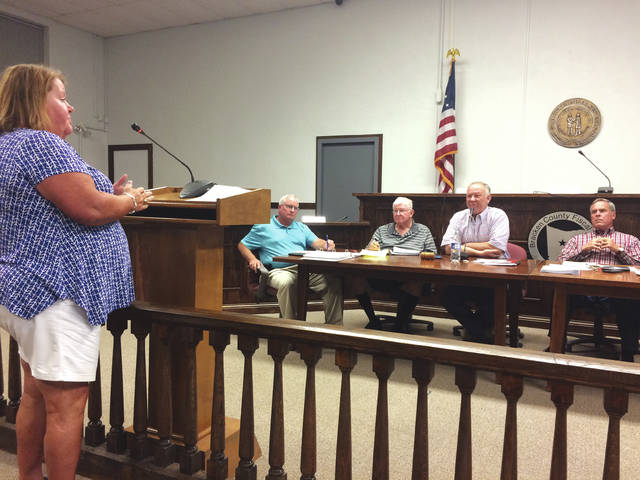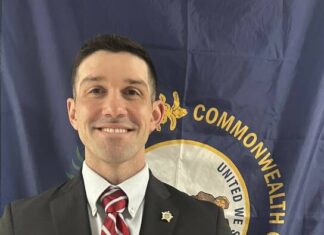BROOKSVILLE — Area residents, many of them upset over plans for a new sewage treatment plant, attended a forum Tuesday to discuss the issue.
A public hearing was held at the Bracken County Courthouse by the Augusta Region Sewer Authority and residents who will become customers of the new wastewater treatment plant. Members of ARSA invited questions and concerns from the community members affected by the plant construction and the subsequent sewage line they will be required to tap into.
“This meeting is for all new customers, not in Brooksville or Augusta, to ask questions about hooking up to the new sewage line,” John Yingling, ARSA board member, said. “It’s for customers who have never hooked into a sewage system. When this goes online, every resident within 300 feet will be required to hook onto it, according to federal, state and local regulations that mandate hookup when sanitary sewer is available.”
Yingling said there are a few exemptions and property owners may request an extension on the connection time. In order to be eligible for an exemption, property owners must provide documentation that their septic field was approved by the Bracken County Health Department, provide documentation that the system was installed within the last 10 years and provide a notarized statement from the health department that the system functions properly.
A panel including ARSA board members and their attorney, Sue Brammer, Bracken County Attorney Beth Moore, Buffalo Trace Area Development District Economic Development Director Kristie Dodge, and several magistrates from the fiscal court was on hand to respond to questions.
ARSA Chairman Randal Smith began the hearing by giving a summary of the project, detailing the plan to create a regional sewer plant for both Augusta and Brooksville. This project, Smith said, has been in the works since 2005.
Questions from the public were then requested by the authority. With an exceptional turnout of 50-60 people, there were certainly many questions.
“What is the reason for the 300 feet limit?” said Betsy Melburn, from Chatham and the first to voice her question.
Melburn mentioned her family having property that is further than the 300 feet requirement. She asked for an arrangement for those properties to be included in the mandatory hookup.
Smith told Melburn to sign user agreements for each of her properties not eligible for the hookup and the plant project will do what it can to accommodate her request.
Many questions asked concerned how the new sewer line will operate, the quality of the grinder pumps that each household will have when connected to the line, as well as who will service the pumps.
Others showed concern for whenever power outages would occur, as the ARSA board said grinder pumps would be inoperable until power is restored. Greg Perkins asked the board what would happen to the water supply should the power go out.
“If you can’t use your water, electric’s off, it’s made to back up outside of the wet well instead of backing up into your home,” said HMB engineer Jeff Reynolds. “Typically when the electric is out, for the most part you’re not using a whole lot of water; but yes, you would be asked to conserve water if the electric goes out.”
Reynolds also said the ARSA board deciding to install generator receptacles for home owners, which ARSA itself would maintain, could remedy the problem. Rita Thomas suggested the installation of solar panels to generate the necessary energy to run the sewer line pumps.
While there were many comments simply asking questions and gathering information, there was an underlying tone of disgruntlement among the public.
Kendra Cline asked the board what will happen if or when she and any other person required to hook up to the sewage line refuses to sign the agreement, to which she garnered applause from the other attendees.
“As far as the ARSA end, you don’t have to sign today,” Moore said. “As far as the ordinance is concerned, once the sewer line comes through, a mandatory hookup is there. If you don’t sign up, we then as a county have to make a decision whether we’re going to enforce the ordinance and charge you or not. You could be fined a fine of anywhere between $20-$100 a day for enforcement on that.”
Overall reception of the sewer line by those affected were rather negative, many of whom said they had no say in the matter and that they weren’t notified of the over decade-long plan to construct the plant.
“KU, Windstream, Columbia Gas, City of Augusta gas and all of the other utility companies — no one mandates that you hook up to them, but 93 of us have to hook up to help pay for it,” said Jerry Thornsberry.
After conducting and navigating through the hearing, Smith said the reception and reactions he received were expected.
“The public as a whole is not overly happy about it,” he said. “I mean, you’re going to have a bill you don’t have now, so the average person is not going to want any more bills than they want to have, that’s normal.”
Smith said the bottom line is the sanitation issue which needs to be addressed and has undergone the process of being addressed for several years.
The ARSA board said the construction project goes up for bids starting Oct. 1.






